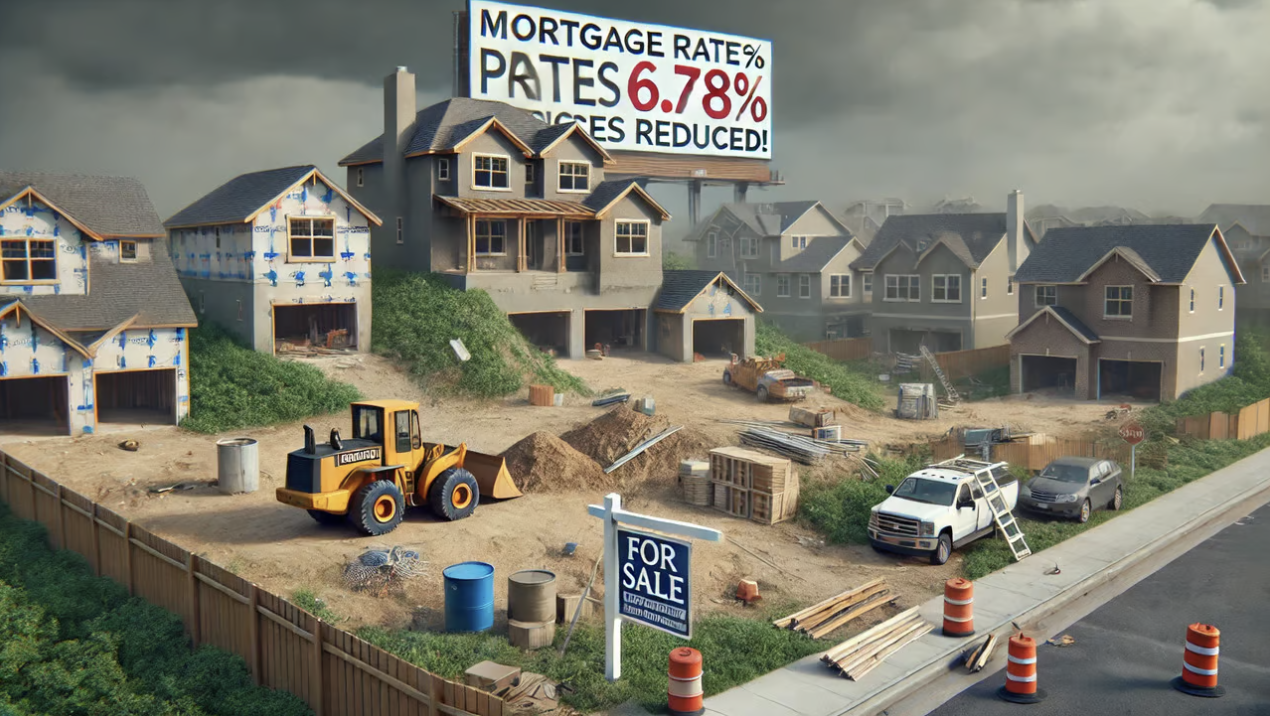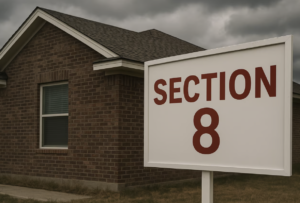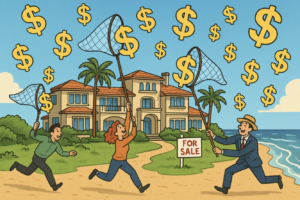- Trust This.
- Posts
- 📉 New home sales stalling
📉 New home sales stalling
And borrowers' fear of rejection is preventing them from applying for new credit or refinances
Trust This.
By Joseph E. Seagle, Esq.
👋 Happy Friday! Today is the last Friday of many folks’ 🌸 Spring 🌺 Break 🌼 vacations, so enjoy the last few days of relaxation before joining the rest of us in the grind.
🚩 Situation Awareness: For those of you involved in subject-to-transactions, in addition to the groundbreaking lawsuit out of Arizona we wrote about last week, now we hear more often of cases where the lenders are accelerating the mortgages and threatening or filing foreclosure based on violation of the mortgage due-on-sale clause. They’re requiring their borrower to provide affidavits of compliance with the Garn-St. Germain Act. The days of buying subject to the mortgage appear to be coming to an end in Florida and across the country. It will be interesting to see how that affects mortgage default and foreclosure rates as the once-sellers’ market shifts to a declining buyers’ market. It will also be interesting to see if it leads to an uptick in hard money lending to investors who instead payoff the mortgages at the purchase like in the old days.
1 big thing: New home sales. Canary in the coal mine?

The U.S. homebuilding industry is approaching a critical juncture. Mortgage rates remain high, dampening demand and pressuring profit margins. According to a recent report from HousingWire, builder sentiment has declined amid concerns over rising material costs, new tariffs, and a sluggish labor market. Without a decline in mortgage rates, homebuilders could face an increasingly difficult year.
📉 By the Numbers
30-year fixed mortgage rate: 6.78% (unchanged)
New home inventory: 655,625 (up by 13,266)
Homebuilder confidence: Declining amid permit stagnation
Building permits: Stalled, with a backlog of homes nearing completion
Why It Matters: The homebuilding sector has historically been a leading indicator of economic downturns. A decline in demand often signals broader economic weakness, which could lead to job losses and a slowdown in consumer spending. For real estate professionals, including realtors, mortgage brokers, and title insurance agents, a potential downturn in home construction could mean lower transaction volumes, fewer financing opportunities, and an overall tougher market.
What’s Driving the Decline?
High Mortgage Rates: Despite some market expectations that rates would soften in early 2025, they remain near 7%, making homeownership less affordable for buyers.
Material Costs & Tariffs: Builders are struggling with rising costs due to new tariffs on imported materials. These tariffs make it more expensive to complete projects, cutting into already thin profit margins.
Labor Market Concerns: As construction permits stagnate, the risk of layoffs in the sector is growing, potentially feeding into broader economic weakness.
Backlog of Completed Homes: With more completed homes sitting on the market, builders are reluctant to start new projects, further slowing construction activity.
Impact on Real Estate Professionals
Realtors: Expect increased competition for a shrinking pool of buyers. More emphasis may be needed on creative financing solutions and builder incentives to close deals.
Mortgage Brokers: With rates remaining high, refinances will stay muted. Adjustable-rate mortgage (ARM) products and other creative lending strategies may see an uptick.
Title Insurance Agents: Slower home sales could lead to fewer title transactions, making operational efficiency crucial in the coming months.
What’s Next? The Federal Reserve’s stance on interest rates will play a crucial role in shaping the market trajectory for the rest of 2025. While some analysts hope for rate cuts, others warn that inflation concerns could keep borrowing costs elevated. If rates remain high, homebuilders may be forced to offer even steeper discounts, further reducing margins.
Bottom Line: The housing market’s current trajectory suggests turbulence ahead. For real estate professionals, staying informed, adapting to buyer hesitancy, and leveraging builder incentives will be key strategies to navigate this shifting landscape.
Go Deeper: HousingWire
2. Potential borrowers’ fear of rejection stifles mortgage applications

Consumers are increasingly hesitant to apply for mortgages and refinancing as fears of rejection grow, according to the latest February 2025 data from the Federal Reserve Bank of New York’s Survey of Consumer Expectations (SCE). This trend poses significant challenges for real estate professionals, from mortgage brokers to realtors and title agents.
Key Findings:
Mortgage rejection concerns at record highs: Consumers now estimate a 47.6% chance of their mortgage application being denied, up sharply from past years.
Refinance uncertainty continues. The perceived likelihood of a refinance rejection is 28.5%, which discourages many homeowners from attempting to lower their rates.
Credit card fears ripple into real estate: With 32.3% of applicants fearing rejection on credit card applications, consumer reluctance to take on debt may spill over into mortgage demand.
A drop in mortgage refinancing interest: The percentage of consumers likely to request a refinance has dropped to just 5.8%, one of the lowest levels in a decade.
Why Consumers Aren’t Applying:
The data suggests a self-reinforcing cycle: fear of rejection leads to fewer applications, which results in a tighter mortgage market with even stricter lending standards. Homebuyers and homeowners who could have qualified may not even try, reducing transaction volume and slowing market momentum.
What This Means for Industry Professionals:
Mortgage Brokers: With fewer applications, brokers must actively educate clients on creditworthiness and alternative loan options to boost confidence.
Realtors: The housing market could slow if potential buyers avoid applying for loans. Realtors should collaborate with lenders to reassure hesitant clients.
Title Agents: Lower mortgage and refinance volumes could impact business, making strategic partnerships with lenders and brokers crucial.
The Bottom Line: Consumers' fear of rejection is stifling credit activity, challenging real estate and lending professionals. Overcoming this hesitation through education, transparency, and alternative financing solutions will be key to sustaining market activity in 2025.
Go deeper: New York Fed

This week, I explain some of the news that has come out of the “simultaneous” deaths of Gene Hackman and his wife. It’s a reminder that where there’s a will, there’s a relative. So plan accordingly.
3. Catch up fast

The Florida cities where home listings are surging the most. Realtor
Despite all the regulatory turmoil in D.C., it looks like private lending regulations won’t be affected. MPA Mag
US mortgage rates dip, fueling application surge despite economic chaos. MPA Mag
Senators demand answers on what’s happening with the enforcement of the Corporate Transparency Act. Reuters
New FHFA director, Pulte, makes sweeping changes to Fannie Mae’s and Freddie Mac’s Boards of Directors, installing himself as chairman of both GSEs. Scotsman Guide
Musk’s ally, Christopher Stanley, resigned from Fannie Mae’s Board just two days after being appointed by Pulte. Bloomberg via Yahoo Finance
Fannie Mae’s growing “blacklist” is paralyzing home sales. HousingWire
Tariffs are starting to affect construction costs. Orlando Business Journal - National Observer
A summary of all the insurance-related bills pending in the current Florida legislative session. Orlando Sentinel (gift link)
Feds have a dimmer outlook on the 2025 economic numbers. WSJ
The Fed holds steady on its benchmark rate and a warning for real estate investors from observers. MPA Mag
Climate change: Why Florida's housing markets are thriving despite the fear. MPA Mag
4. Closing Thought: 📢 The Buck Stops Here: Leadership Accountability

On Sunday afternoon, after a morning at the groomer, the buck stops on the living room sofa for Edward (L) and Rufous.
Strong leadership isn’t just about celebrating wins—it’s about owning setbacks. In real estate and business, leaders who take credit for success must also take responsibility when things go wrong.
Why it matters: Accountability fosters trust, credibility, and long-term success. Whether you’re leading a brokerage, managing an investment portfolio, or running a development firm, the ability to own mistakes—and fix them—is what separates great leaders from the rest.
Reality check: Passing blame is easy, but it weakens your leadership. Clients, investors, and teams want a leader who stands firm in both good times and bad.
🔹 Wins and losses go hand in hand: If you take credit for a record quarter, you must also own up to a deal that falls through.
🔹 Your team follows your lead: A culture of accountability starts at the top. If you dodge responsibility, expect the same from your team.
🔹 Reputation matters: A leader who shifts blame loses credibility. Transparency builds long-term trust with partners and clients. Plus, never being accountable for mistakes is the sign of a wimp, not a leader.
What’s next:
✅ Acknowledge mistakes quickly. Leaders don’t need to be perfect, but they must be honest.
✅ Find solutions, not scapegoats. Focus on fixing the problem rather than blaming others.
✅ Learn and adapt. Every setback is an opportunity to refine strategies and improve processes.
The bottom line: Leadership means accepting both praise and responsibility. In real estate and business, the buck must stop somewhere—make sure it stops with you.
We hope you found this helpful — any feedback is appreciated and can be shared by hitting reply or using the feedback feature below.
Was this email forwarded to you? Subscribe here.
Have an idea or issue to share? Email us.
Connect with us using your preferred social media and website links for MyLandTrustee and Aspire Legal Solutions.
Our mailing address: PO Box 547945, Orlando, FL 32854-7945
Our physical address: 1901 West Colonial Drive, First Floor, Orlando, FL 32804
Be on the lookout for our next issue! 👋






Reply
Keep reading
🤯 Insurers lied to get laws changed in their favor?
Florida's legislature thinks they were played in 2022, and is making a bipartisan effort to get to the bottom of the potential scandal
Climate risks and text messaging clarity
Climate risks could wipe out $1.5 trillion but at least we now know the rules on text message marketing
Trust This. May 19, 2023